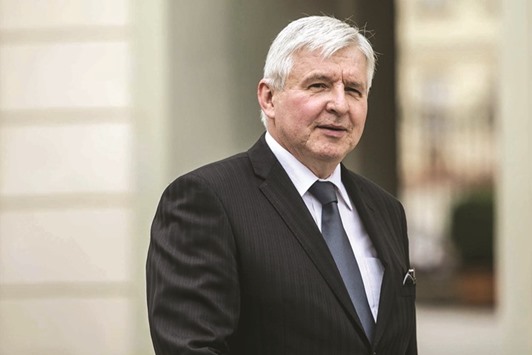Coming from a nation that prides its citizens’ “golden hands” that can fix anything, newly minted Czech central bank Governor Jiri Rusnok needs those skills now more than ever.
As central banks around the world tinker with ad-hoc policy regimes to stoke price growth, the country known for building machines from cars to computers is preparing to dismantle its own. With inflation seen accelerating, Rusnok is preparing to wind down a mix of near-zero interest rates and a Switzerland-inspired cap on the koruna sometime next year.
The only Czech who has held all three posts of prime minister, finance minister and central bank chief, he replaces Miroslav Singer, who faced public ire over the unconventional policies that drove up import prices and eliminated returns on bank deposits.
Rusnok has a new challenge: returning the koruna to a float while avoiding sharp appreciation like that seen in the franc when Swiss policy makers dropped their cap last year.
“Rusnok’s job will be to dismantle the Swiss-style currency cap without roiling the market the way Switzerland did,” said Marek Drimal, senior economist at Societe Generale’s unit in Prague. “He’ll likely face speculative inflows that may force him to impose negative rates and scrutiny by Czech companies, consumers and politicians. Communication will be the toughest part.”
The soft-spoken, grey-haired 55-year-old will chair his inaugural meeting of the policy-making panel in Prague today and oversee the review of the bank’s new economic forecasts. While the board is expected to keep the regime in place, the forecasts may confirm its guidance for ending the limit on koruna gains at about 27 per euro in mid-2017.
Gross domestic product, fuelled in part by factories producing cars including from Volkswagen’s Skoda Auto and electronics from Foxconn Technology Co, expanded 3% in the first three months of the year, and unemployment of 4% in May was the lowest in the European Union. Still, inflation is stuck deep below the central bank’s 2% target. Part of that’s from cheap oil prices, whose impact policy makers see eventually fading to allow interest rates, now at 0.05%, to rise next year.
Rusnok has said developments don’t warrant more action by the central bank, which has bought about $24bn worth of foreign currencies to keep the koruna weaker since 2013. At the same time, he’s made clear the policy can’t go on forever.
“It certainly isn’t a measure that can replace reasonable economic policy,” Rusnok said at his first meeting with reporters in July. “It would be wrong to think that we can come to happiness through some repeated depreciation of the koruna.”
With some investors buying koruna in expectation of a payoff when the cap is lifted, the currency has been stuck in a narrow range near the intervention level, trading at 27.04 in Prague yesterday.
At the same time, the interventions are flooding the market with fresh koruna liquidity, pressing government’s cost of borrowing lower. The yield on five-year state bonds traded at minus 0.05% on Tuesday.
Rusnok’s promotion to lead the central bank from his long-time ally, President Milos Zeman, caps two decades of close cooperation between the two. Once fellow members of the Social Democrats, Rusnok served as finance minister in Zeman’s cabinet in 2000. He later left the party and became the head of ING Group’s Czech pension fund.
With a reputation for building consensus, Rusnok won a seat on the advisory council of former centre-right Prime Minitser Petr Necas, who imposed unprecedented austerity cuts. When that cabinet collapsed in 2013, Zeman bypassed parliamentary procedures and named Rusnok care-taker premier.
Even though that frustrated parties across the political spectrum, Rusnok’s appointment to the central bank has met little opposition. He’s pledged continuity, and Singer called the selection a “wise choice.”
Rusnok has also brushed off Zeman’s condemnation of the koruna limit as an “unnecessary experiment” that’s delaying euro adoption, even while striking a different tone than his predecessor. While Singer often opposed euro adoption, arguing independent monetary policy helped the country during the crises, Rusnok is more open to the idea.
“We won’t present ourselves like an ideological centre for the refusal of deeper integration,” Rusnok told Czech Television in May. “Our movement will be mostly less eurosceptic, even if we maintain our critical view of the current functioning of the monetary union and the eurozone.”

Rusnok: Preparing to wind down a mix of near-zero interest rates.
